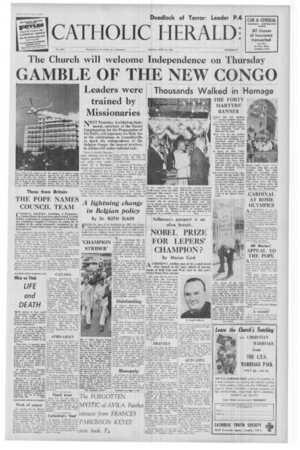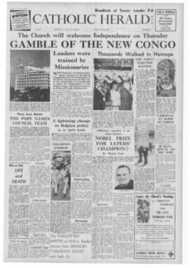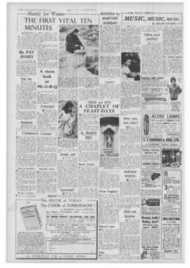Page 1, 24th June 1960
Page 1

Page 5

Report an error
Noticed an error on this page?If you've noticed an error in this article please click here to report it.
Tags
Share
Related articles
The Church Will Welcome Independence On Thursday
Background
King Leopold's Forgotten Holocaust
Future Is In The Balance
White Men In Africa
A lightning change in Belgian policy
By Dr. RUTH SLADE
FROM the time of its foundation in 1885. the Congo independent State was virtually the private possession of Leopold II. King of the Belgians. until in 1908 it was taken over as a Belgian colony and ruled with benevolent paternalism but with little preparation for its own coming of
age.
In the educational field, for example, education for the masses traditionally took priority over the formation of an elite; it was not until 1956 that the Congo's first university, the Catholic university of Lovanium, was opened at L6opoldville.
Now, on June 30, 1960, as the result of a lightning change in Belgian policy over the past two years, the Congo is due to join the growing number of African independent states.
Christianity has reached well over half the total population of some 13,230,000. The number of Catholics in the Belgian Congo in June 1959 is given as 4,865,813, with 604,663 catechumens—that is, nearly double the Catholic population of ten years ago. Protestant statistics for 1959 give over 800,000, adult communicants, with nearly 400,000 catechumens and some 1,000,000 adherents.
Outstanding
In Princeps Pastoruni. Pope John XXIII pointed to the development of a local hierarchy and a local clergy as the outstanding fact among missionary developments of the last forty years. This is true in the Congo as elsewhere.
The first African was ordained priest there in 1917; in 1949 there were about a hundred and fifty Congolese priests, while today there are four African bishops and nearly four hundred African priests.
The establishment of the hierarchy in the Congo has been discussed for years, but it was hindered by being linked with the hope of arriving at certain agreements with the colonial government. There was no reason to delay longer once it was clear that the days of this colonial government were numbered, and last November Pope John XXIII created six ecclesiastical provinces in the Congo: Leopoldville. Coquilhatville, Stanleyville, Bukavu, Luluabourg and Elisabethville.
Monopoly
As yet there is no African archbishop. but the diocesan bishops of Lueho and Goma and the auxiliary bishops of Leopoldville and Kisantu are Congolese.
Until recently the majority of Catholic missionaries in the Congo
A GAMBLE IN THE CONGO
have been Belgians. or at least have belonged to congregations with a mother-house or a province in Belgium. (The London-based Mill Hill Fathers, in the Congo since 1905, are an exception).
Until 1948 Belgian missions (mainly Catholic) were subsidised for their educational work. while foreign missions (mainly Protestant) were not. Since 1948. foreign missions have been subsidised on equal terms with Belgian missions. and several non-Belgian Catholic missions have taken over newly-erected vicariates-thus. for example, there are now Germans in the Kwango and Italians in the Kivu.
This breakdown of the Belgian monopoly has helped to point to the universality of the Church at a time when Catholic missions risked being identified in Congolese eyes with the Belgian colonial authority.
Close ties
Catholic missions. uniike Protestant missions. had traditionally conserved close links with the colonial administration. Looking hack now. on the eve of independence. it seems providential that the election in Belgium of a Liberal-Socialist coalition Government in 1954 led to a clash between the Government and the Catholic missions over educational policy in the Congo. with the result that the Catholic missions broke away from these close links with the State.
Thus the Church in the Congo has endeavoured to dissociate evangelization from the colonial system. and is ready to welcome independence. Already in 1956 a declaration of the Bishops made it clear that the Church approved in ' principle of political emancipation. Last August another collective letter from the Bishops stated that " the Church welcomes with great hopefulness the announcement of independence for the Congo ".
With regard to the political situation, the Bishops found it " legitimate and wise that Catholics should collaborate with Chris• liens of other confessions or with non-Christians on the level of temporal institutions ".
They went on to say that " if the Church has sometimes supported one given political party. in certain countries, it is because this
party is the only one to offer guarantees which arc indispensable from the Christian point of view. But she has never considered this situation as ideal ".
All Congolese leaders were educated in mission schools. Catholic or Protestant, and it is to he hoped that the majority ef political parties will be respectful of spiritual values and religious institutions.
The Bishops have warned Catholics against identifying the Church with any particular poli• Beal groups, tribal or otherwise. and thus setting up false oppositions between other groups and the Church.
There has been an anti-clerical current in the Congo for several years. particularly in the towns.
Many Africans have come to feel that Christianity is a European affair. that the Church is exclusively European in form and expression.
But in an independent Congo the Church will be freed from a situation where is can appear that Christian missions arc only one expression of European colonialism. and will be able to grow to maturity in a way which is not possible in a country not yet autonomous.
Renewal
It is not only the establishment of a local hierarchy which is necessary. but also a cultural emancipation which will only be accomplished when Christianity has expressed itself in forms which are proper to the Congo. It is the great good fortune of the Church in Congo--indeed, of the Church in Africa-that at this critical stage in her development she is able to benefit from those movements of renewal which are marking the Church in Europethe liturgical movement, the Biblical movement, the ecumenical movement, the lay apostolate and certain forms of social action-at the same time as she struggles to re-express and re-incarnate in her own way the Christian message which has been brought to her by Europeans.
So far as numbers go, the Congo has known a movement of conversion remarkable in Africa; the Church in an independent Congo will have the task of continuing to work for the conversion in depth which is vitally necessary to her well-being.
blog comments powered by Disqus









